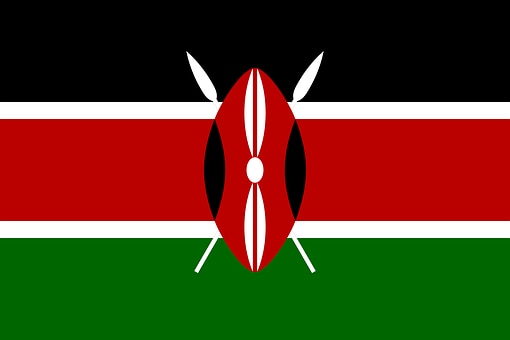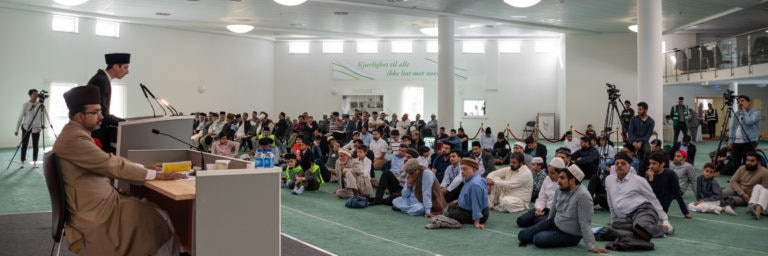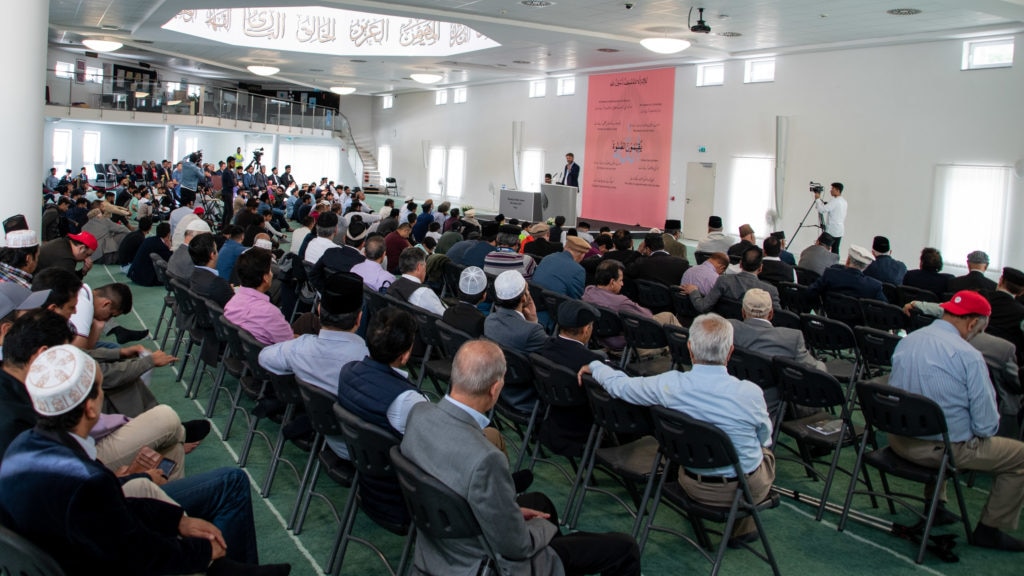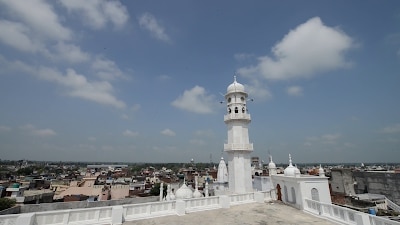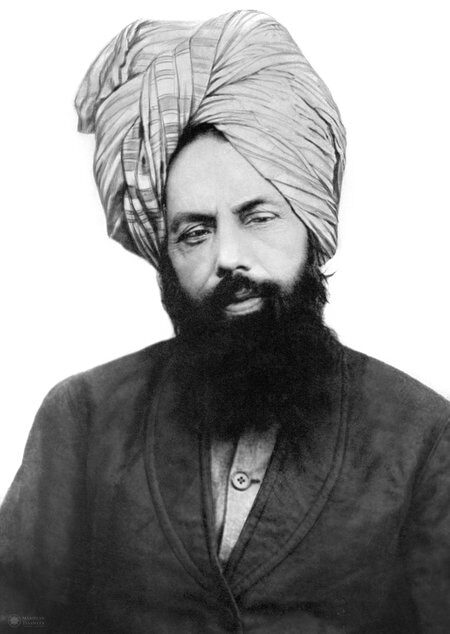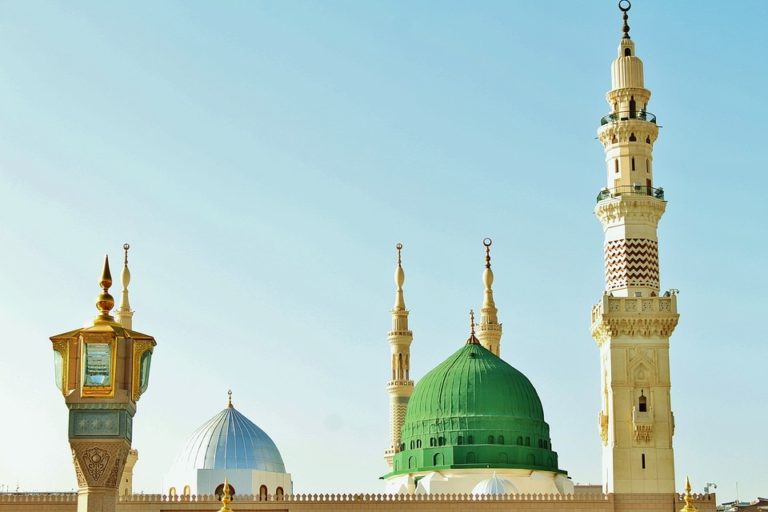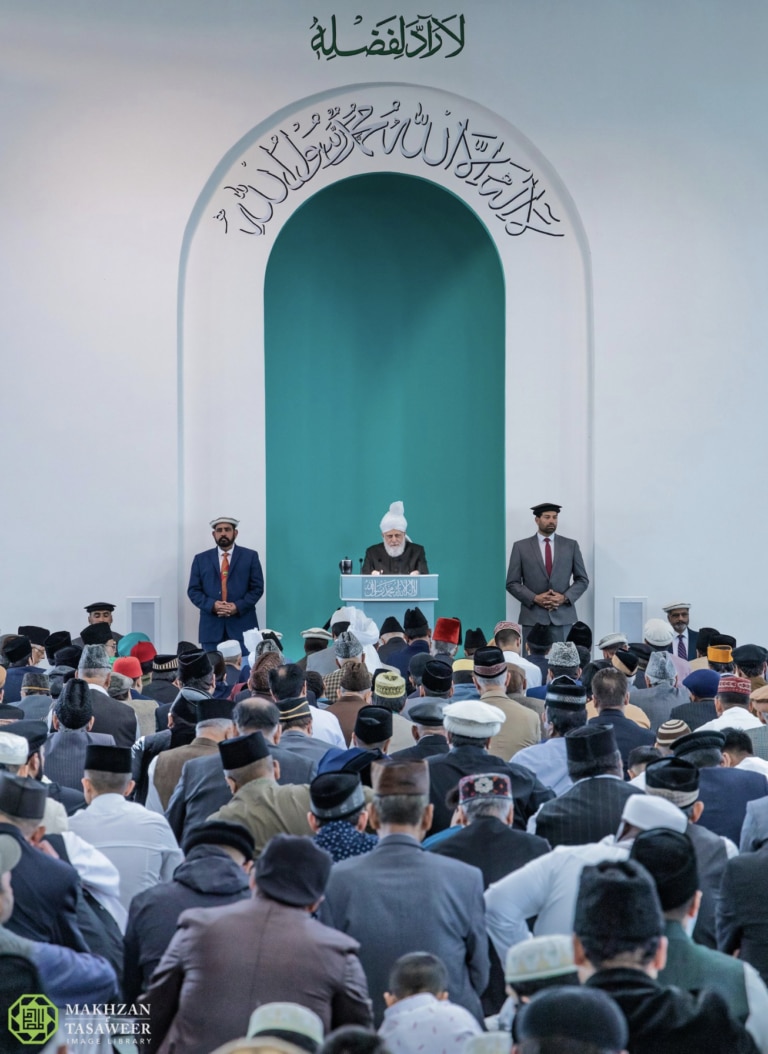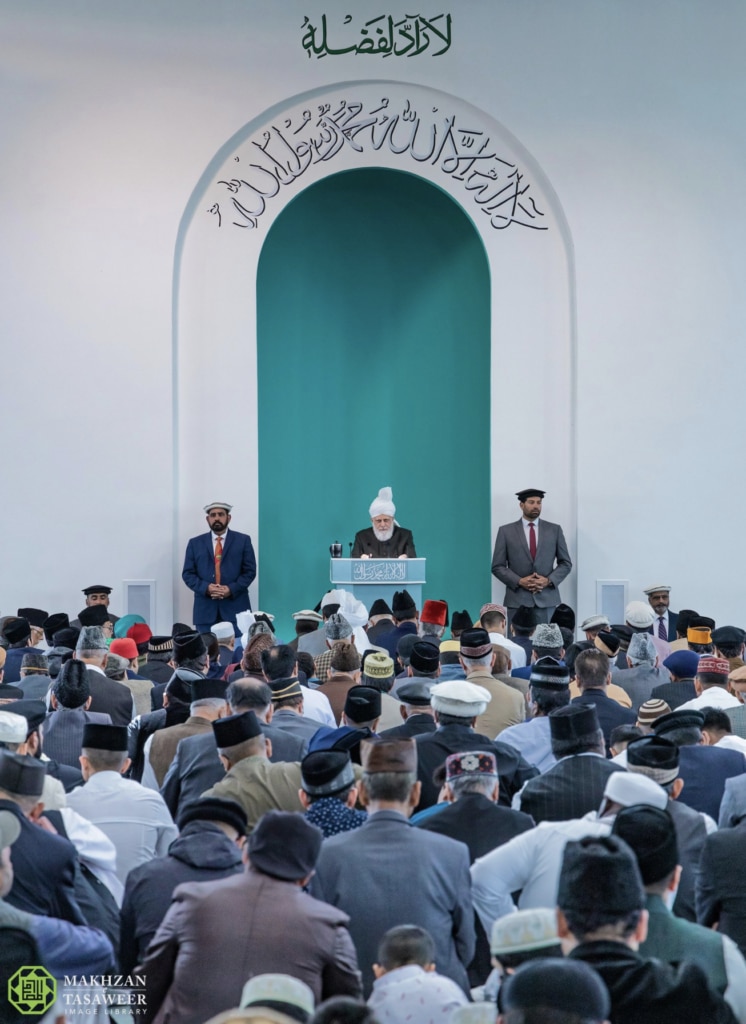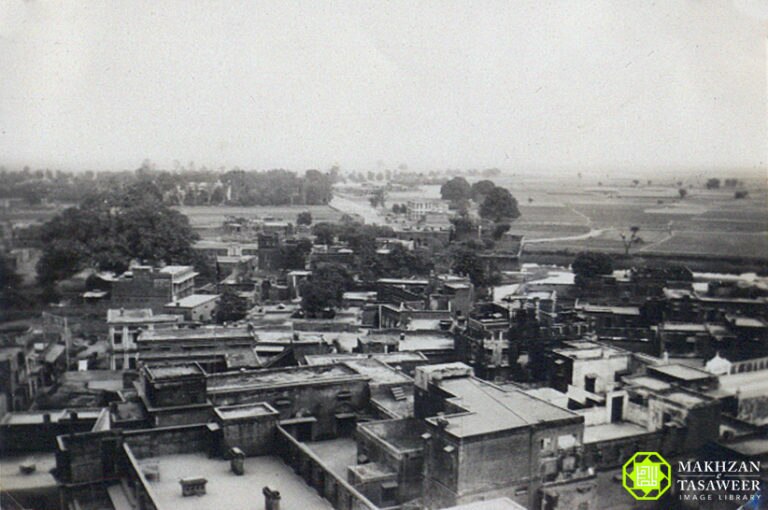Friday Sermon
26 July 2019
Men of Excellence
After reciting the Tashahud, Ta‘awuz, and Surah al-Fatihah, Hazrat Khalifatul Masih Vaa stated:
Today, I
shall continue to relate accounts of the Badri companions’ lives [those
companions who took part in the Battle of Badr].
The first companion to be mentioned is
Hazrat Muzahirra bin Rafay. The name of Hazrat Muzahir’s father was
Rafay bin Adi. Hazrat Muzahirra belonged to the Banu Harithah bin
Harith clan of the Aus tribe of the Ansar. Hazrat Muzahirra and
Hazrat Zuhairra were brothers and both of them were paternal uncles
of Hazrat Rafayra bin Khudaij. (Al-Sirat al-Nabawiyyah li Ibn
Hisham, p. 324 footnote, Dar-ul-Kutub al-Ilmiyyah, Beirut, 2001)
Hazrat Rafayra bin Khudaij is
being mentioned because, although he was not a Badricompanion, but
nevertheless, he holds great importance in history. Hazrat Muzahirra
was his uncle, and so Rafay was his nephew’s name as well as his father’s.
I shall briefly mention about Hazrat Rafayra
that he was the companion who presented himself for participation in the Battle
of Badr, but the Holy Prophetsa sent him back due to his young age.
He later permitted him to participate in the Battle of Uhud. Hazrat Rafayra
participated in the battles of Uhud, the Ditch and the rest of the battles. His
collarbone was struck by an arrow on the day of Uhud and although the arrow was
removed but a piece of the arrowhead remained in his body until his demise.
The Holy Prophetsa once said to
Hazrat Rafayra, “I will bear witness in your favour on the Day of
Judgment.” Hazrat Rafayra passed away during the reign of Abdul
Malik bin Marwan in 74 AH at the age of 86.
(Usdul Ghaba Fi Marifat Al-Sahaba Li
Ibn Athir, Vol. 2, p. 232-233, Rafay bin Khudaijra, Dar-ul-Kutub
al-Ilmiyyah, Beirut, 2008)
In any case, these were some details in
reference to his nephew. However, I will now continue to relate the account of
Hazrat Zuhairra.
Imam Bukharirh has mentioned
that Hazrat Zuhairra participated in the Battle of Badr along with
his brother. He has not recorded the name of that brother, however, the
commentators of Bukhari have written that the brother’s name was
Muzahir. Similarly, regarding Hazrat Zuhairra bin Rafay, it is
written in Subul al-Huda War-Rashaad, a book on the biography of the
Holy Prophetsa, that according to Bukhari, his brother,
Hazrat Muzahirra, also participated in the Battle of Badr.
Earlier, I stated the name of Hazrat
Zuhairra, however I am relating the account of Hazrat Muzahirra.
In the books on the biographies of the
companions, such as Usdul Ghaba, al-Isabah
and al-Isti‘ab etc. there is no mention of Hazrat Muzahir’s
participation in the Battle of Badr. With regard to Hazrat Muzahirra,
it is written in these three books that Hazrat Muzahirra
participated in the Battle of Uhad and in all the subsequent battles alongside
the Holy Prophetsa. Hazrat Muzahirra passed away during
the Khilafat of Hazrat Umarra. (Sahih al-Bukhari,
Kitabul Maghazi) (Irshad As-Sari Li Sharhi Sahih al-Bukhari, Vol 7, p
195, Darul Fikr, Beirut, 2010) (Subulal Huda War Rashaad, Vol 4, p.106,
Ghazwah Badrul Kubra, Dar-ul-Kutub al-Ilmiyyah, Beirut, 1993)
(Usdul Ghaba, Vol. 5, p. 185, Muzahir bin Raafi, Dar-ul-Kutub
al-Ilmiyyah, Beirut, 2003) (Al-Isaba Fi Tamyeez Al-Sahaba, Vol. 6, p.
106, Muzahir bin Raafi, Dar-ul-Kutub al-Ilmiyyah, Beirut, 1995) (Al-Isti‘ab
Fi Ma’rifatil Ashaab, Vol. 4, p. 39, Muzahir bin Raafi, Dar-ul-Jeel,
Beirut, 2002)
However, the sources that prove that
Hazrat Muzahirra participated in the Battle of Badr are considered
more reliable.
Yahya bin Sahl bin Abu Hathmah narrates
that Hazrat Muzahirra bin Rafay Harithi brought some strong workmen
along with him from the region of Levant so that they may work on his land.
When he arrived at Khaybar, he stayed there for three days. There, the Jews
started to instigate those labourers to murder Hazrat Muzahirra and
also secretly gave them a few knives. When Hazrat Muzahirra came out
of Khaibar and arrived at a place called Sibaar, which is situated six miles
away from Khaibar, these men attacked Hazrat Muzahirra, piercing his
abdomen as a result of which he was martyred.
Following this, these individuals returned
to Khaybar upon which the Jews gave them provisions for their journey as well
as food and set them off until they returned and reached Levant again. When
Hazrat Umarra bin al-Khattab was informed of this news, he said that
he would set out towards Khaybar, distribute the wealth that was found there
and clearly mark the boundaries in the land. That is, revenge would be sought.
He also declared that he would exile the Jews from there as the Holy Prophetsa
had said in relation to them that he would grant them protection until God
Almighty had granted them protection. Now, God Almighty had granted permission
to exile them. Hence, Hazrat Umarra exiled them.
(Kanzul Ummal, Vol. 4, p. 509,
Ikhraajul Yahood, Hadith 11505, Mu’assisah al-Risalah, Beirut) (Al-Isti‘ab,
Vol. 4, pp. 39-40, Muzahir bin Raafi, Dar-ul-Kutub al-Ilmiyyah, Beirut, 2002) (Mu‘jamul
Buldan, Vol. 2, p. 6, Dar Ihyaa al-Turath al-Arabi, Beirut)
The incident of the martyrdom of Hazrat
Muzahirra occurred in 20 AH. (Al Kamil Fi Al Tarikh li Abi Hasan
bin Ali, Vol 2, p.410, Dar-ul-Kutub al-Ilmiyyah, Beirut, 2002)
Then, the next companion to be mentioned
is Hazrat Malikra bin Qudamah. Hazrat Malikra bin
Qudamah’s father was Qudamah bin Arfajah, and according to one narration, the
name of his paternal grandfather has been mentioned as Harith. That is, he was
referred to as Harith instead of Arfajah. Hazrat Malik belonged to the clan of
Banu Ghanam of the Ansar tribe of Aus. Hazrat Malikra participated
in the Battle of Badr along with one of his brothers, Hazrat Munzirra
bin Qudamah. Hazrat Malikra also participated in the battle of Uhud.
(Al-Sirat al-Nabawiyyah li Ibn Hisham, p.
466, Dar-ul-Kutub al-Ilmiyyah, Beirut, 2001) (Al-Tabaqaat-ul-Kubra
li ibn Sa‘d, Vol. 3, p. 367, Dar-ul-Kutub al-Ilmiyyah, Lebanon, 1990)
The next companion to be mentioned is
Khuraimra bin Fatik. Hazrat Khuraimra bin Fatik belonged
to the Banu Asad. His father’s name was Fatik bin Akhram and his name has also
been recorded as Akhram bin Shaddad. Hazrat Khuraim’s title was Abu Yahya,
whereas according to another narration, it has been mentioned as Abu Ayman
because the name of his son was Hazrat Ayman bin Khuraim. Hazrat Khuraimra
bin Fatik participated in the Battle of Badr along with his brother, Hazrat
Sabrahra bin Fatik.
(Al-Tabaqaat-ul-Kubra li ibn Sa‘d,
Vol. 2, p. 167, Khuraim bin Faatik, Dar-ul-Kutub al-Ilmiyyah, Beirut, 2008)
According to a narration, Hazrat Khuraimra
also participated in the Treaty of Hudaybiyyah. A lesser known narration also
states that Hazrat Khuraimra and his son, Hazrat Aymanra,
accepted Islam following the Conquest of Mecca along with the tribe of Banu
Asad. However, the first narration is more authentic in that Hazrat Khuraimra
participated in the Battle of Badr. Furthermore, Imam Bukharirh
mentioned him as a Badri companion [who participated in the battle of Badr] in
his book, Al-Tareekh-ul-Kabeer.
Hazrat Khuraimra and his son
later went to Kufa and according to one narration, both of them moved to the
city of Raqqa, which is a well-known city located to the north of the Euphrates
River. Both of them passed away there during the rule of Hazrat Amir Muawiyahra.
(Al-Isaba Fi Tamyeez Al-Sahaba, Vol.
2, p. 236, Khuraim bin Faatik, Dar-ul-Fikr, Beirut, 2001) (Al-Tarikh Al
Kabir, Abdullah Muhammad bin Ismael Bukhari, Vol 3, p.196, Dar-ul-Kutub
al-Ilmiyyah, Beirut, 1995) (Mu‘jamul Buldan, Vol. 4, pp. 413-414)
Hazrat Khuraimra bin Fatik
narrates his incident of accepting Islam in the following manner: “I went in
search of my lost camels and while seeking their trail, night had fallen.
Eventually, I found them at Abraq-ul-Azaha‘f, which is the name of the famous
well belonging to the Banu Asad bin Khazima, which is situated on the way from
Medina to Basra. I found the camels there, tied them up at the very same place
and took some rest, leaning against the leg of one of the camels.”
In other words, he sat there to spend the
night. He further says: “This took place towards the early period of the Holy
Prophet’s migration. I said in a loud voice that I seek the protection of the
chief of this valley.”
This was their custom at that time. Hazrat
Khuraimra says that during the period of ignorance [i.e. prior to
the advent of Islam], this was a customary practice of the people. During the
period of ignorance, when a person entered a barren valley in order to spend
the night, he would utter these words in order to remain protected from the
evil of its inhabitants and the foolish people. Nevertheless, he says: “All of
a sudden, an individual called me whilst I was uttering these words and he said
the following couplets:
‘May God have mercy on you. You should
seek the protection of Allah, the Magnificent, Who sends down all that which
has been made unlawful and lawful.
Affirm the Oneness of God, and you will
have no concerns about the trials from Jinns. Remembrance of Allah Almighty
will grant your protection from the Jinns in the surrounding lands and
mountains for many miles. Their plots will become unsuccessful, and nothing
will remain except for the righteous person and virtuous deeds.’”
This means that only good deeds would
continue and no evil would remain.
Hazrat Khuraimra further
narrates: “I responded, ‘O you who has proclaimed this! Do you consider this as
the truth or are you merely seeking to misguide me?’” (The concept of the unity
of God seemed strange to him because beliefs during the days of ignorance were
contrary to this. “However, he replied, ‘He is the Messengersa of
Allah! He is a bearer of glad-tidings, who brought Yasin and Hameemaat and
other detailed chapters [of the Holy Quran] which explain everything. He has
clearly distinguished what is forbidden and what is lawful. He commands us to
offer prayer and observe fast. He forbids people from committing evil deeds,
the evil which was witnessed amongst the people before us.’”
This was the response he gave as regards
how they learnt about the message of the unity of God. Hazrat Khuraimra
further narrates:
“I replied, ‘May Allah have mercy on you!
Who are you?’ He replied, ‘I am Malak bin Malik. The Messengersa of
Allah sent me to watch over the Jinn of the people of Najjad, (i.e. the chiefs
of the people of Najjad).’” (This was the conversation that took place between
the two). Hazrat Khuraimra stated, “If there was someone who would
look after my camels for me then I would surely visit this Prophet and indeed
accept him.”
He liked what he heard about the message
regarding the unity of God. Malak bin Malik replied, “I will take the
responsibility of looking after your camels and will ensure they reach your
family safely.” Hazrat Khuraimra states:
“I prepared one of my camels and rode it
to Medina and entrusted the rest to him. I arrived at the time of Jumuah
[Friday Prayers], and everyone was engaged in offering prayers, so I decided it
was better to go inside after they had completed their prayer. Since I was also
tired, I therefore sat down and also rested my camel. Abu Dharra
came outside and informed me that the Holy Prophetsa had instructed
me to come inside, and so I went inside.
“When the Messengersa of Allah
saw me, he stated, ‘What happened to the elderly man who had guaranteed the
safe delivery of your camels to your house? Has he delivered your camels safely
to your house.’”
Thus, Allah the Almighty had shown a
vision to the Holy Prophetsa and had informed him about the entire
incident. Hazrat Khuraimra further states:
“When I heard this, I stated, ‘May Allah
have mercy on him.’ The Prophet of Allahsa replied, ‘Indeed, may
Allah have mercy on him.’” Hazrat Khuraimra states, “I responded to
this by proclaiming, ‘I bear witness that there is none worthy of worship
except Allah.’” Thus, this was the beautiful manner in which he accepted Islam.
(Al-Mu‘jam Al-Kabir, Hafiz Abul
Qasim bin Ahmad Tibrani, Vol 4, pp.211-213, Hadith No. 4166, Maktaba Ibn
Taymiyyah, Cairo) (Al-Sirat al-Nabawiyyah li Ibn Hisham, Vol 1, p. 379, Dar-ul-Ma’rifah,
Beirut, 1976) (Mu‘jamul Buldan, Vol. 1, p. 68, Dar Ihyaa al-Turath
al-Arabi, Beirut) (Bulugh Al-Rabb, Dr Pir Muhammad Hasan, Vol 3, p. 135,
Urdu Science Board, Lahore, 2002)
Hazrat Khuraimra himself has
related this account of his acceptance of Islam. Hazrat Khuraimra
bin Fatik had a very graceful personality and very meticulous nature. He was
always well-dressed and well maintained.
(Seeratus
Sahabah, Vol 7, p. 307, Dar-ul-Ishaat, Karachi)
Prior to accepting Islam, he would wear an
extra-long lower garment and kept long hair. There is a hadith recorded about
this in Mustadrak Al-Hakim. Hazrat Khuraimra bin Fatik narrates that
once the Holy Prophetsa arrived and stated, “O Khuraim! You would have
been an excellent person if you did not possess these two traits.” Upon this
Hazrat Khuraimra submitted, “O Messengersa of Allah! May
my mother and father be sacrificed for your sake. What are those two traits?”
The Holy Prophetsa replied, “Your long hair and allowing your lower
garment to drag.” This referred to wearing extra-long lower garment, which was
considered a sign of arrogance in those days. Hence, Hazrat Khuraimra
went and had his hair cut and shortened his lower garment.
(Al-Mustadrak Ala Al-Sahihain,
Vol. 6, p. 2363, Kitab Marifatu Al-Sahaba, Hadith No. 6608, Maktabah Nazzaar
Mustafah, Mecca, 2000)
There is another narration in Tarikh-ul-Kabir
by Hazrat ibn Hanzaliyyah that the Holy Prophetsa said, “How
wonderful a man would Khuraim Asadi be if he did not let his hair grow to his
shoulders or allow his lower garments to drag on the floor” i.e. not wear the izar
or lower part of his clothes so long, out of pride. When Hazrat Khuraimra
came to know about this he took a short blade and cut his hair to the height of
his ears, rather than keeping the long hair he had. Furthermore, he cut the
lower garments up to the middle of his calves. (Al-Tarikh
Al Kabir, Abdullah Muhammad bin Ismael Bukhari, Vol 3, p.196, Dar-ul-Kutub
al-Ilmiyyah, Beirut, 2001)
This is because wearing a long lower
garment was perceived as a sign of arrogance in those days.
Therefore, this is a response for those
men who are of the opinion that there is no harm in keeping long hair, without
reason or cause.
One should keep the length of their hair
to the length which the Holy Prophetsa has stated i.e. to the
earlobes; it should not be long like the hair of women. Hazrat Khuraimra
also participated in the conquests of Syria in the time of Hazrat Umarra.
(Seeratus
Sahabah, Vol 7, p. 307, Dar-ul-Ishaat, Karachi)
Hazrat Qaisra bin Abu Hazim and
Hazrat Aamirra Sha‘bi relate that Marwan bin Hakam asked Hazrat
Aiman bin Khuraimra, “Why do you not join us in battle?” He replied,
“My father and my uncles participated in the Battle of Badr and they strongly
admonished me not to fight against anyone who declares that there is no God but
Allah.”
Hazrat Aimanra then said to
Marwan bin Hakam, “If you have brought me a guarantee of safeguarding against
the hell-fire then I shall join you in battle.” Upon this, Marwan told him to
leave. So he went forth reciting the couplets, “I shall not fight another
[Muslim] simply because he praises another leader from among the Quraish. For
him is his rule and for me is my own sin. I seek refuge with Allah from such
ignorance and animosity. How can I kill an innocent Muslim? If I had done so
then it would be of no avail to me, no matter how long I live.”
(Al-Mustadrak Ala Al-Sahihain,
Vol. 3, p. 1004, Kitab Marifatu Al-Sahaba, Zikru Khuraim bin Faatik, Hadith No.
2667, Maktabah Nazzaar Mustafah, Mecca, 2000)
If we look at the actions of the Muslims
nowadays, we will see just how far they have drifted away from the true
teachings of Islam.
The next Companion I shall mention is
Hazrat Ma‘marra bin Harith. Hazrat Ma‘marra bin Harith
belongs to the Banu Jumuah tribe of the Quraish. His father was Harith bin Ma‘mar
and his mother was Qutailah bint Maz‘un, who was the sister of Hazrat Uthmanra
bin Maz‘un. Therefore, Hazrat Usmanra bin Maz‘un was the maternal
uncle of Hazrat Ma‘marra. Hazrat Ma‘marra had two
brothers – Hatibra and Hattabra. All three of them had accepted
Islam prior to the Holy Prophetsa entering Dar-e-Arqam. Hazrat
Ma‘marra is counted among
اَلسَّابِقُوْنَ الْاَوَّلُوْنَ
“The
foremost among the believers”. (Usdul Ghaba, Vol. 5, p. 226,
Dar-ul-Kutub al-Ilmiyyah, Beirut, 2008)
Hazrat Aishara bint Quddamah
relates that from among the Banu Maz‘un – Hazrat Usmanra, Hazrat
Quddamahra, Hazrat Abdullahra, Hazrat Sa‘ib bin Usman bin
Maz‘unra and Hazrat Ma‘marra
bin Harith migrated from Mecca to Medina and stayed at the house of Hazrat
Abdullahra bin Salama Ajlani.
(Al-Tabaqaat-ul-Kubra li ibn Sa‘d,
Vol. 3, p. 307, Dar-ul-Kutub al-Ilmiyyah, Beirut, 1990) (Al Badaya Wan
Nahaya Li Ibne Katheer, Vol 7, p. 139, Dar-ul-Kutub al-Ilmiyyah, Beirut,
2001)
The Holy Prophetsa established
a bond of brotherhood between Hazrat Ma‘marra and Hazrat Muazra
bin Afraa. Hazrat Ma‘marra bin Harith participated in all the
battles alongside the Holy Prophetsa, including the battles of Badr,
Uhud and the Ditch and all other battles. Hazrat Ma‘marra bin Harith
passed away in 23 AH during the Khilafat of Hazrat Umarra.
The next companion is Zuhairra
bin Rafay. He was the brother of the previously mentioned companion, Hazrat
Muzahirra. Hazrat Zuhairra belonged to the Banu Haritha
bin Harith branch of the Aus tribe of the Ansar.
(Al-Sirat al-Nabawiyyah li Ibn Hisham, p.
209, Dar Ibn Hazm, Beirut, 2009)
Hazrat Zuhairra bin Rafay had a
son named Usaid, who also had the good fortune of being a companion of the Holy
Prophetsa. Hazrat Zuhairra was the paternal uncle of
Rafay bin Khudaij, whose account I have already mentioned. Hazrat Zuhair’s wife
was Fatima bint Bishar, who belonged to the Bani Adi bin Ghanam tribe.
(Usdul Ghaba, Vol. 3, p. 103,
Zuhair bin Raafi’, Dar-ul-Kutub al-Ilmiyyah, Beirut, 2008) (Usdul Ghaba,
Vol. 1, pp. 243-244, Usaid bin Zuhair, Dar-ul-Kutub al-Ilmiyyah, Beirut, 2008)
(Al-Tabaqaat-ul-Kubra li ibn Sa‘d, Vol. 4, p. 273, Dar-ul-Kutub
al-Ilmiyyah, Beirut, 1990)
Hazrat Muzahirra bin Rafay and
Hazrat Zuhairra bin Rafay were brothers and both brothers had the
opportunity of participating in the Battle of Badr.
(Usdul Ghaba, Vol. 3, p. 103,
Zuhair bin Raafi’, Dar-ul-Kutub al-Ilmiyyah, Beirut, 2008) (Sahih
al-Bukhari, Kitabul Maghaazi)
Majority of the historical sources state
that they were both present during the Battle of Badr. Hazrat Zuhairra
was present during the Second Bai‘at at Aqabah and participated in all Battles
alongside the Holy Prophetsa, including the Battles of Badr and
Uhud.
(Usdul Ghaba, Vol. 3, p. 103,
Zuhair bin Raafi’, Dar-ul-Kutub al-Ilmiyyah, Beirut, 2008)
Hazrat Rafayra bin Khudaij
narrates on the authority of his uncle – Hazrat Zuhairra – that his
uncle once said, “The Holy Prophetsa forbade us from something which
later proved to better for our own good.” “I [Hazrat Rafayra bin
Khudaij] replied, ‘Whatever the Holy Prophetsa had commanded was
indeed the best advice.’ Hazrat Zuhairra then stated, ‘The Holy
Prophetsa called me and asked, “What do you do with your crop
fields?” I answered that we lease our land to others, on the condition that we
can take the crops that grow near the furrow.’”
This means that they would take those
crops that grow near the water, which were of a better quality. These were a
few wasq of dates and barley. One wasq consists of 60 saa
and one saa is equivalent to approximately 2.5 kilograms. Having
listened to all of this, the Holy Prophetsa stated, “Refrain from
doing this. You ought to harvest those crops yourselves, or get those crops
harvested by someone else for you, or else, leave it uncultivated.” Hazrat
Rafayra replied, “Indeed, I have understood and will act according
to this in the future.”
(Sahih al-Bukhari, Vol 4, Hadith
No. 2339) (Lughaat Al Hadith, Vol 4, p.51)
Hazrat Rafayra then said that
subsequently, they would harvest the crops themselves or obtain the crops in a
manner whereby everyone received their due share.
The next companion to be mentioned is
Hazrat Amrra bin Iyaas. Hazrat Amrra was from Yemen and
was the confederate of the Banu lauzan of the Ansar tribe. His father’s name
was Iyaas bin Amr and according to another narration, Hazrat Amr’sra
paternal grandfather’s name was Zaid. Hazrat Amrra participated in
the battles of Badr and Uhud alongside the Holy Prophetsa. Hazrat
Amrra was the brother of Hazrat Rabi‘ra bin Iyaas and
Hazrat Warqahra bin Iyaas. All three brothers had the opportunity of
participating in the Battle of Badr.
(Al-Sirat al-Nabawiyyah li Ibn Hisham, p.
469, Dar-ul-Kutub al-Ilmiyyah, Beirut, 2001) (Usdul
Ghaba, Vol. 4, p. 186, Dar-ul-Kutub al-Ilmiyyah, Beirut, 2008)
The next companion is Hazrat Mudlijra
bin Amr. The name of Hazrat Mudlijra bin Amr is also recorded as
Midlaaj. He belonged to the Banu Hajar branch of the Banu Sulaim tribe and were
the confederates of the Banu Kabir bin Ghanam bin Dudaan tribe. According to
another narration, the Banu Sulaim were the confederates of the Banu Amr bin
Dudaan, who in turn were the confederates of the Banu Abdi Shams tribe.
(Al-Tabaqaat-ul-Kubra li ibn Sa‘d,
Vol. 3, p. 53, Beirut, 1996) (Al-Sirat al-Nabawiyyah li Ibn Hisham, p. 469, Dar-ul-Kutub
al-Ilmiyyah, Beirut, 2001) (Al-Isaba Fi Tamyeez Al-Sahaba, Vol. 6, p.
49, Dar-ul-Kutub al-Ilmiyyah, Beirut, 1995)
Hazrat Mudlajra participated in
the Battle of Badr alongside two of his brothers, Hazrat Saqafra bin
Amr and Hazrat Malikra bin Amr. Hazrat Mudlijra bin Amr
participated in all the battles alongside the Holy Prophetsa
including the Battles of Badr and Uhud.
(Al-Isti‘ab, Vol. 4, pp. 31-32,
Dar-ul-Kutub al-Ilmiyyah, Beirut, 2003) (Usdul Ghaba, Vol. 5, p. 127,
Dar-ul-Kutub al-Ilmiyyah, Beirut, 2003)
Hazrat Mudlajra passed away in
50 AH during the rule of Hazrat Amir Muawiyyahra.
(Al-Tabaqaat-ul-Kubra li ibn Sa‘d, Vol.
3, p. 53, Dar-ul-Kutub al-Ilmiyyah, Beirut, 1990)
The next companion to be mentioned is
Hazrat Abdullah bin Suhailra. Hazrat Suhail’s father was Suhail bin
Amr and his mother’s name was Fakhta bint Amr. Hazrat Abdullahra’s
brother’s name was Abu Jandal who was younger than Hazrat Abdullahra.
Hazrat Abdullah was also known by the title Abu Suhail and belonged to the Banu
Aamir bin Loi tribe of the Quraish. Ibn-e-Ishaq has made mention of Hazrat
Abdullah bin Suhailra in his book on Islamic history in reference to
the second migration to Abyssinia. When Hazrat Abdullah bin Suhailra
returned from Abyssinia, his father detained him and forced him to abandon his
faith. Hazrat Abdullah bin Suhailra expressed his intention to leave
Islam. He stated to his father that he would abandon Islam and subsequently, he
travelled with the idolaters to the Battle of Badr. Although he had stated that
he would leave Islam, however, his heart was not content with this decision.
Nonetheless, he set off for the Battle of Badr alongside the idolaters. Hazrat
Abdullah bin Suhailra travelled to Badr on the expenditure of his
father, Suhail bin Amr, and also used his mount. His father had no inclination
that he had abandoned their [idolatrous] faith and had in fact accepted Islam
once again. When the Muslim army encountered the army of the idolaters of Mecca
and both armies were facing each other, Hazrat Abdullah bin Suhailra
returned to the Muslims and presented himself before the Holy Prophetsa
before the battle commenced. In this way, Hazrat Abdullahra
participated in the Battle of Badr as a Muslim. At the time of the battle he
was 27 years old. Due to this action of his, Hazrat Abdullahra’s
father – Suhail bin Amr – became enraged.
Hazrat Abdullah bin Suhailra
participated in all of the battles alongside the Holy Prophetsa
including the battles of Badr, Uhud and the Ditch. During the Conquest of
Mecca, Hazrat Abdullahra sought amnesty for his father from the Holy
Prophetsa, i.e. to grant him protection. He went to the Holy Prophetsa
and said, “O Messengersa of Allah! Would you grant my father
protection?” The Holy Prophetsa replied, “He has been granted safety
due to the decree of God Almighty. Therefore, he has been granted protection
and he ought to come outside.” The Holy Prophetsa then said to those
around him, “Whosoever of you sees Suhail bin Amr, do not look upon him with
disdain. I swear on my life, indeed Suhail bin Amr is an intelligent and noble
man. Any person with the characteristics that Suhail possess will inevitably
accept Islam.” Hazrat Abdullah bin Suhailra narrated the entire
incident to his father, who responded by saying: “By God! He [i.e. Muhammadsa]
was righteous in his youth and even in his old age.” Subsequently, Suhail
accepted Islam and after this incident of granting him peace, he would say that
God Almighty had bestowed great favours upon his sons through Islam.
Hazrat Abdullahra participated
in the Battle of Yamama in 12 AH, during the Khilafat of Hazrat Abu Bakrra
and he was martyred in this very battle at the age of 38. On one occasion,
Hazrat Abu Bakrra travelled to Mecca to perform the hajj during his
Khilafat. Whilst he was staying in Mecca, Hazrat Abdullah’s father, Hazrat
Suhailra bin Amr came to visit Hazrat Abu Bakrra. Hazrat
Abu Bakrra offered his condolences for the martyrdom of Hazrat
Suhail’s son [i.e. Hazrat Abdullahra]. Hazrat Suhailra
replied, “I have heard that the Holy Prophetsa once said that the
one who is martyred can intercede for 70 members of his family. I am hopeful
that on the Day of Judgement, my son will not begin with anyone before me.”
i.e. when he passes away, that his son would intercede for him.
According to another source, it is stated
that Hazrat Abdullahra was martyred in Juwasa, Bahrain, at the age
of 88. In Juwasa, Bahrain, there is a fort named “Abdul Qais”, which was
conquered by A’la bin Hadhrami in 12 AH, during the Khilafat of Hazrat Abu Bakrra.
(Al-Tabaqaat-ul-Kubra li ibn Sa‘d,
Vol. 3, pp. 216-217, Dar-ul-Kutub al-Ilmiyyah, Beirut, 1996) (Al-Isaba Fi
Tamyeez Al-Sahaba, Vol. 4, p. 107, Dar-ul-Kutub al-Ilmiyyah, Beirut, 2005)
(Usdul Ghaba, Vol. 3, p. 272, Abdullah bin Suhail, Dar-ul-Kutub
al-Ilmiyyah, Beirut, 2008) (Usdul Ghaba, Vol. 2, p. 585, Suhail bin Amr
Qarshi, Dar-ul-Kutub al-Ilmiyyah, Beirut, 2008) (Mu‘jamul Buldan, Vol.
2, p. 84, Dar Ihyaa al-Turath al-Arabi, Beirut)
Nonetheless, there are two narrations [with regard to his demise].
The next companion that I will mention is Hazrat Yazid bin Harithra, who belonged to the Banu Ahmar bin Haritha clan of the Ansar tribe of the Khazraj. Hazrat Yazid’s fathers name was Harith bin Qais and his mother’s name was Fusham, who belonged to the Qain bin Jusar tribe. Qain was a branch of the Khudha’a tribe of Yemen. Hazrat Yazidra was also known as Yazid Fusham and Yazid bin Fusham due to his mother.
(Al-Sirat al-Nabawiyyah li Ibn Hisham, p.
474, Al-Ansar wa man ma’ahum, Dar-ul-Kutub al-Ilmiyyah, Beirut, 2001)
(Al-Tabaqaat-ul-Kubra li ibn Sa‘d, Vol. 3, p. 115, Dar-ul-Kutub
al-Ilmiyyah, Beirut, 1990) (Al-Ansaab Li Samaani, Vol 10, p.545 footnote,
Maktabah Shamilah)
One of the brothers of Hazrat Yazidra
was Abdullah bin Fusham and was also known by the name of Zus-Shamaalain. With
regards toHazrat Umair bin Abdi Amr, who was known as Zus-Shamaalain,
Ibn Hisham narrates that Hazrat Umair was known as Zus-Shamaalain
because he was lefthanded and would primarily use his left hand. He was also
known as Zul-Yadain due to his long hands. Similarly, another reason why
he was known as Zul-Yadain was because he was skilled with both his
hands. His full name was Umair bin Abdi Amr Khuza‘i. After migrating to Medina,
the Holy Prophetsa established a bond of brotherhood between Hazrat
Umairra and Hazrat Yazidra bin Harith. The reason why
Hazrat Umair bin Abdi Amr, i.e. Zus-Shamaalain, was mentioned was that a
bond of brotherhood was established between him and Hazrat Yazidra
bin Harith. Both Hazrat Yazid and Hazrat Zus-Shamaalain had the good
fortune of participating in the Battle of Badr and both attained martyrdom in
this very battle. Naufal bin Muawiyya Deeli martyred Hazrat Yazidra
but according to another narration, Hazrat Yazidra was martyred by
Tu‘aimah bin Adi.
(Al-Tabaqaat-ul-Kubra li ibn Sa‘d,
Vol. 3, p. 275, Dar-ul-Kutub al-Ilmiyyah, Beirut, 1996) (Al-Isaba Fi Tamyeez
Al-Sahaba, Vol. 6, p. 511, Dar-ul-Kutub al-Ilmiyyah, Beirut, 2005) (Usdul
Ghaba, Vol. 5, p. 449, Yazid bin Harith, Dar-ul-Kutub al-Ilmiyyah, Beirut,
2006) (Al-Sirat al-Nabawiyyah li Ibn Hisham, p. 461,
Al-Ansar wa man ma’ahum, Dar-ul-Kutub al-Ilmiyyah, Beirut,
2001)(Ar Raudul Anf, Vol 5, p. 299) (Al-Tabaqaat-ul-Kubra li ibn Sa‘d,
Vol. 3, p. 124, Dar-ul-Kutub al-Ilmiyyah, Beirut, 1990)
On the day of the Battle of Badr, Hazrat
Yazidra bin Harith had a few dates in his hand, which he threw away
and began fighting. Subsequently, he was martyred during the battle.
(Al-Isaba Fi Tamyeez Al-Sahaba, Vol.
6, p. 511, Dar-ul-Kutub al-Ilmiyyah, Beirut, 2005)
The next companion who will be mentioned
is Hazrat Umairra bin Humaam, who belonged to the Banu Haraam bin
Kaab tribe, which was a sub-branch of the Khazraj tribe of the Ansar called the
Banu Salamah.
(Al-Sirat al-Nabawiyyah li Ibn Hisham, p.
476, Dar-ul-Kutub al-Ilmiyyah, Beirut, 2001)
Hazrat Umairra’s fathers name
was Humaam bin Jamu and his mother’s name was Nawaar bint Aamir.
(Al-Tabaqaat-ul-Kubra li ibn Sa‘d,
Vol. 3, p. 426, Umair bin Al Hammam, Dar-ul-Kutub al-Ilmiyyah, Beirut, 2012)
The Holy Prophetsa established
a bond of brotherhood between Hazrat Umairra bin Humaam and Hazrat
Ubaidahra bin Harith Muttalbi, upon his migration to Medina. Both of
these companions were among those who were martyred during the Battle of Badr.
(Usdul Ghaba, Vol. 4, p. 278,
Dar-ul-Kutub al-Ilmiyyah, Beirut, 2008)
During
the Battle of Badr, when the idolaters were approaching, the Holy Prophetsa
said, “Move forward to attain paradise, the breadth of which spans the heavens
and the earth.” The narrator says, “Hazrat Umairra bin Humaam asked,
‘O Messengersa of Allah! Did you mention that Paradise spans the
breadth of the heavens and the earth?’“The Holy Prophetsa replied,
‘Yes’. Upon this, he said, ‘Bakhe Bakhe [How wonderful that is indeed].’
The Holy Prophetsa then asked the reason why he said Bakhe Bakhe.
Hazrat Umairra replied, ‘O Prophetsa of Allah! By
God, I merely say this owing to my desire of becoming among the dwellers of
paradise.’ The Holy Prophetsa replied, ‘Indeed, you are among the
dwellers of paradise.’ Hazrat Umairra bin Humaam then took out some
dates from his quiver and began to eat them and said, ‘If I remain alive to
finish all of these, I will consider myself to have been granted a long life.’”
The narrator of this tradition further
states, “Hazrat Umairra bin Humaam then threw away those dates and
began to fight against the disbelievers till he was ultimately martyred.”
(Sahih Muslim, Kitabul Imaarah,
Hadith 3506)
On the occasion of the Battle of Badr,
Hazrat Umairra bin Humaam was reciting the following couplets:
رَکْضًا
اِلَی اللّٰہِ بِغَیْرِ زَادِ اِلَّا التُّقٰی وَ عَمَلَ الْمَعَادِ وَالصَّبْرَ
فِی اللّٰہِ عَلَی الْجِھَادِ اِنَّ التُّقٰی مِنْ اَعْظَمِ السَّدَادِ وَ خَیْرُ
مَا قَادَ اِلَی الرَّشَادِ وَ کُلُّ حَیٍّ فَاِلٰی نَفَادِ
“I take nothing with me from my provisions
apart from Taqwa [righteousness] and the hope of the hereafter. I remain
steadfast in my Jihad in the way of God.
Indeed, Taqwa is the most excellent thing
and the best source of guidance. And all those living, shall one day taste
death.” (Usdul Ghaba, Vol. 4, p. 278, Dar-ul-Kutub
al-Ilmiyyah, Beirut, 2008)
Hazrat Umairra bin Humaam was
the first person to attain the status of martyrdom in Islam from among the
Ansar. He was martyred by Khalid bin A‘lam. However, there some who claim that
Hazrat Harithara bin Qais was the first to be martyred amongst the
Ansar companions. Thus, there are two narrations and both were martyred during
the Battle of Badr.
(Al-Tabaqaat-ul-Kubra li ibn Sa‘d,
Vol. 3, p. 426, Dar-ul-Kutub al-Ilmiyyah, Beirut, 1990) (Al-Sirat
al-Halabiyyah, Vol. 2, p. 222, Bab Dhikr Maghaziyah, Dar-ul-Kutub
al-Ilmiyyah, Beirut, 2002)
The next companion to be mentioned is
Hazrat Humaidra Ansari. Hazrat Zubairra narrates that one
day he had a dispute with one of the Ansar, who had taken part in the Battle of
Badr, over a small watercourse in an arid region. In order to settle their
dispute, they both presented their case to the Holy Prophetsa
because they both used this watercourse to irrigate their land. The Holy
Prophetsa said to Hazrat Zubairra, “Zubair, you should
water your land first (since it was his land) and then leave the water for your
neighbour.” i.e. let the water run freely to reach the other companions’ land
as well. Upon hearing this decision, the Ansari companion became upset and
said, “O Prophetsa of Allah! Are you passing this decision in his
favour because he is the son of your paternal aunt?” The complexion of the Holy
Prophetsa’s face became red and he said to Hazrat Zubairra,
“I gave my initial decision to also grant him some of the water as an act of
benevolence but now it is a question of one’s actual right. Therefore, hold
back the water till it reaches the ridge and give all the water to your land
only.”
Thus, the Holy Prophetsa
granted Hazrat Zubairra what was rightfully his. Initially, the Holy
Prophetsa gave his decision in which there was some provision for
the Ansar Companion as well, but when the Holy Prophetsa became
displeased with this companion, he gave Hazrat Zubairra the full
share of what was rightfully his. Urwah states that Hazrat Zubairra
used to say, “By God, I believe that the following verse was revealed in
relation to this very incident:
فَلَا وَ رَبِّکَ لَا یُؤۡمِنُوۡنَ حَتّٰی یُحَکِّمُوۡکَ
فِیۡمَا شَجَرَ بَیۡنَہُمۡ
“But no, by thy Lord, they are not
believers until they make thee judge in all that is in dispute between them…”
[Surah al-Nisa: V.66]
I shall also quote the full verse which is
as follows:
فَلَا وَ رَبِّکَ لَا یُؤۡمِنُوۡنَ حَتّٰی یُحَکِّمُوۡکَ
فِیۡمَا شَجَرَ بَیۡنَہُمۡ ثُمَّ لَا یَجِدُوۡا فِیۡۤ اَنۡفُسِہِمۡ حَرَجًا
مِّمَّا قَضَیۡتَ وَ یُسَلِّمُوۡا تَسۡلِیۡمًا
“But no, by thy Lord, they are not
believers until they make thee judge in all that is in dispute between them and
then find not in their hearts any demur concerning that which thou decidest and
submit with full submission.” It is mentioned in Al-Asaba, Usdul
Ghaba and in the commentary of Sahih al-Bukhari that the name of the
Ansar companion who had a dispute with Hazrat Zubairra was Hazrat
Humaid Ansarira, who took part in the Battle of Badr.
(Usdul
Ghaba, Vol. 2, p. 76, Atiyyah bin Nuwairahra, Dar-ul-Kutub
al-Ilmiyyah, Beirut, 2008) (Al-Isaba Fi Tamyeez Al-Sahaba, Vol. 2, p.
112, Dar-ul-Kutub al-Ilmiyyah, Beirut, 2005) (Irshad As Saari Li Sharah
Sahih Al Bukhari, Kitabus Sulah, Hadith No. 2708, Darul Fikr, Beirut, 2010)
However, at times, Satan can secretly
incite people. In any case, God Almighty has already proclaimed to grant His
forgiveness for those Companions who took part in the Battle of Badr.
The next companion is Hazrat Amrra
bin Muaz bin Nauman Ausi. Hazrat Amr’s father’s name was Muaz bin Nauman and
his mother’s was Kabsha bint Rafi. Hazrat Amrra bin Muaz was the
brother of Hazrat Saadra bin Muaz, who was the leader of the Ashali
tribe from the Ansar. Those who belonged to the tribe of Banu Abdil Ashahal
were also known as Ashali. A large number of people accepted Islam from this
tribe.
It has been narrated from Hazrat Asimra
bin Umar bin Qatadah that the Holy Prophetsa established a bond of
brotherhood between Hazrat Amrra bin Muaz from among the Ansar and
Hazrat Umairra bin Abu Waqas, who migrated to Medina from Mecca.
Umairra bin Abu Waqas was the brother of Hazrat Saadra
bin Abu Waqas. Hazrat Amrra bin Muaz took part in the Battle of Badr
along with his brother, Hazrat Saadra. Hazrat Amrra bin
Muaz was martyred during the Battle of Uhad by Dhirar bin Khataab. Dhirar
attacked Hazrat Amrra bin Muaz with a spear which pierced through
his body and then mockingly said, “Do not let that individual out of your sight
who will get you married to Hoorun Ain.” At the time, Dhirar said this
in a very mocking fashion. Dhirar accepted Islam on the day of the Conquest of
Mecca.
Hazrat Amrra bin Muaz was 32
years of age when he was martyred. Dhirar bin Khataab bin Mirdas’ father,
Khataab, was the leader of the Banu Fehr during his time. He had prepared a
resting place for those people travelling from his tribe. On the day of the
Battle of Fujaar, Dhirar was the leader of the Banu Harib bin fehr. Amongst the
Quraish, Dhirar was considered one of the skilled riders and courageous individuals
and was also among its eloquent poets. It is also stated that he was among the
4 individuals who crossed the trench on the occasion of the Battle of Khandaq.
Ibn Isakur Dimashqi has counted him among the companionsra in his
book, Tarikh Dimashq. Zirar accompanied Hazrat Abu Ubaidara in the
conquest of Syria and accepted Islam on the occasion of the conquest of Mecca.
His acceptance of Islam is widely confirmed and his poetic works also prove
this.
(Usdul Ghaba, Vol. 4, p. 260,
Dar-ul-Kutub al-Ilmiyyah, Beirut, 2008) (Usdul Ghaba, Vol. 2, p.
447-448, Dar-ul-Kutub al-Ilmiyyah, Beirut, 2008)
(Al-Isaba Fi Tamyeez Al-Sahaba, Vol.
4, p. 567, Dar-ul-Kutub al-Ilmiyyah, Beirut, 2005)
(Al-Isti‘ab,
Vol. 3, p. 279, Umair bin Muaz Ashahil, Dar- ul-Kutub al-Ilmiyyah, Beirut,
2002) (Al-Tabaqaat-ul-Kubra li ibn Saad, Vol. 2, p. 359,
Dar-ul-Kutub al-Ilmiyyah, Beirut, 1990) (Al Ansaab, Abu Saad Abdul Kareem bin
Muhammad bin Mansoor Al Tameemi, Vol 1, pp. 283-284, Maktabah Ibn Taymiyyah,
2009)
The next companion is Hazrat Masudra
bin Rabieya bin Amr. Hazrat Masudra bin Rabieya belonged to the
Qaara tribe and they were the confederates of the Banu Zuhra tribe. Hazrat
Masud’s title was Abu Umair. Hazrat Masud’s father was Rabee and his name is
also reported as Rabieya and Amir. Hazrat Masudra had a son called
Abdullah. Hazrat Masud’s family was also known in Medina as Qari. Hazrat Masudra
bin Rabieya accepted Islam prior to the Holy Prophetsa coming to
Dar-e-Arqam. When Hazrat Masudra bin Rabieya migrated to Medina, the
Holy Prophetsa established a bond of brotherhood with Hazrat Ubaidra
bin Taiyhaan. Hazrat Masudra bin Rabieya participated in all the
battles alongside the Holy Prophetsa, including the Battle of Badr,
Uhad and Khandaq. Hazrat Masudra passed away in 30AH and was just
over 60 years of age.
(Al-Sirat al-Nabawiyyah li Ibn Hisham, pp.
460-461, Dar-ul-Kutub al-Ilmiyyah, Beirut, 2001) (Al-Tabaqaat-ul-Kubra
li ibn Saad, Vol. 3, p. 89-90, Dar-ul-Kutub al-Ilmiyyah, Beirut, 1996) (Usdul
Ghaba, Vol. 5, pp. 154-155, Dar-ul-Kutub al-Ilmiyyah, Beirut, 2003) (Al-Isaba
Fi Tamyeez Al-Sahaba, Vol. 6, p. 77, Darul Fikr, Beirut, 2001)
May God Almighty elevate the rank of the
companions and may we also continue to adopt their good deeds.
I would now briefly like to mention that
from next Friday, Insha-Allah, Jalsa Salana UK will be starting. Pray that may
God Almighty bless this in every respect.
Those who have been assigned duties, they
should strive to fulfil them with their utmost effort and abilities and they
should also pray that may God Almighty enable them to fulfil their duties in
the best manner. May God Almighty enable them to serve the guests of the
Promised Messiahas in an excellent fashion.
This year, the department overseeing
transport will have to work even harder and for this they would also need
implement a proper plan because they will have to transport the guests who are
residing in the various Jamaat accommodations to Islamabad for a few days
before and after the Jalsa. I instructed the Afsar Jalsa Salana to plan
accordingly and I am hopeful that they have begun working on this, so that the
guests can also come to Islamabad and offer their prayers. The transport system
to Hadeeqatul Mahdi is already in place for the Jalsa days.
May God Almighty enable everyone to fulfil
their duties in a most exemplary manner.
(Translated by The Review of Religions.
Originally published in Al
Fazl International, pp. 5-9, 16 August 2019)

